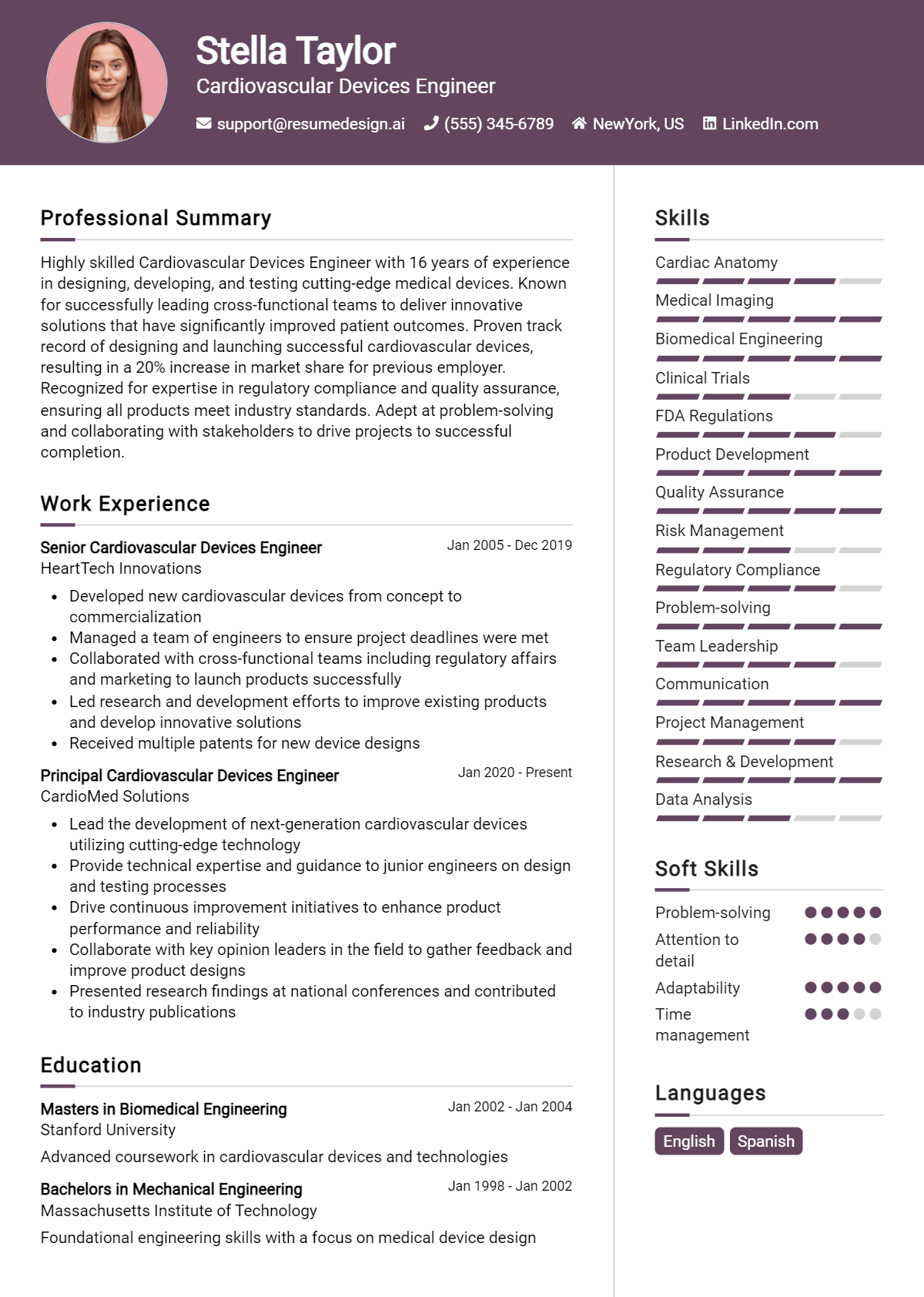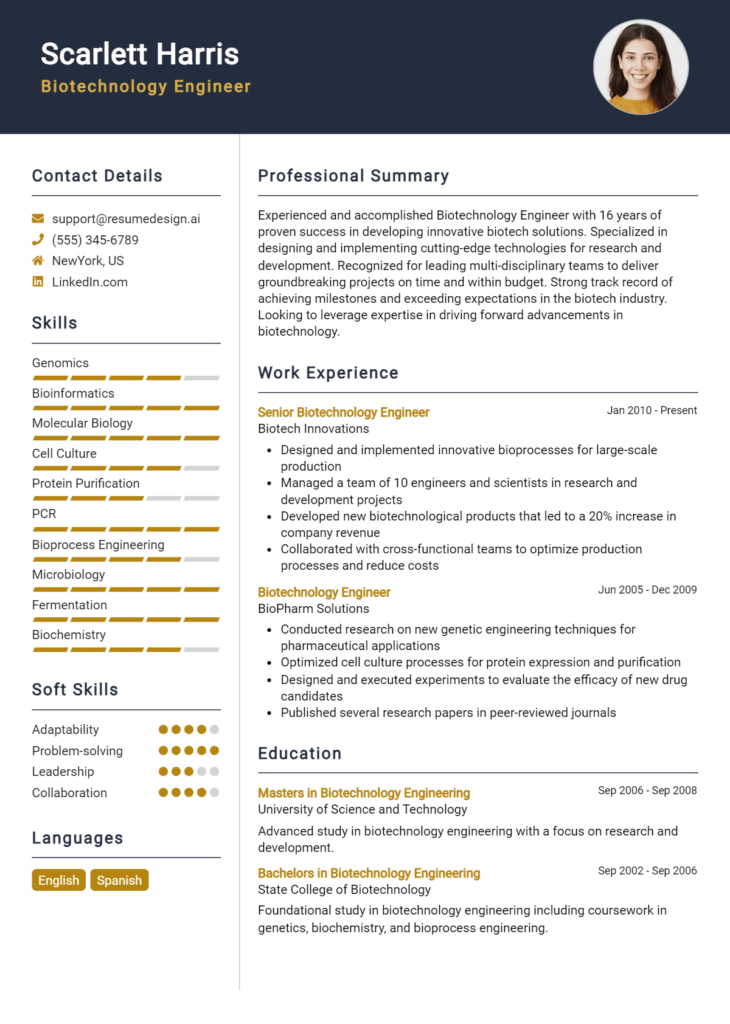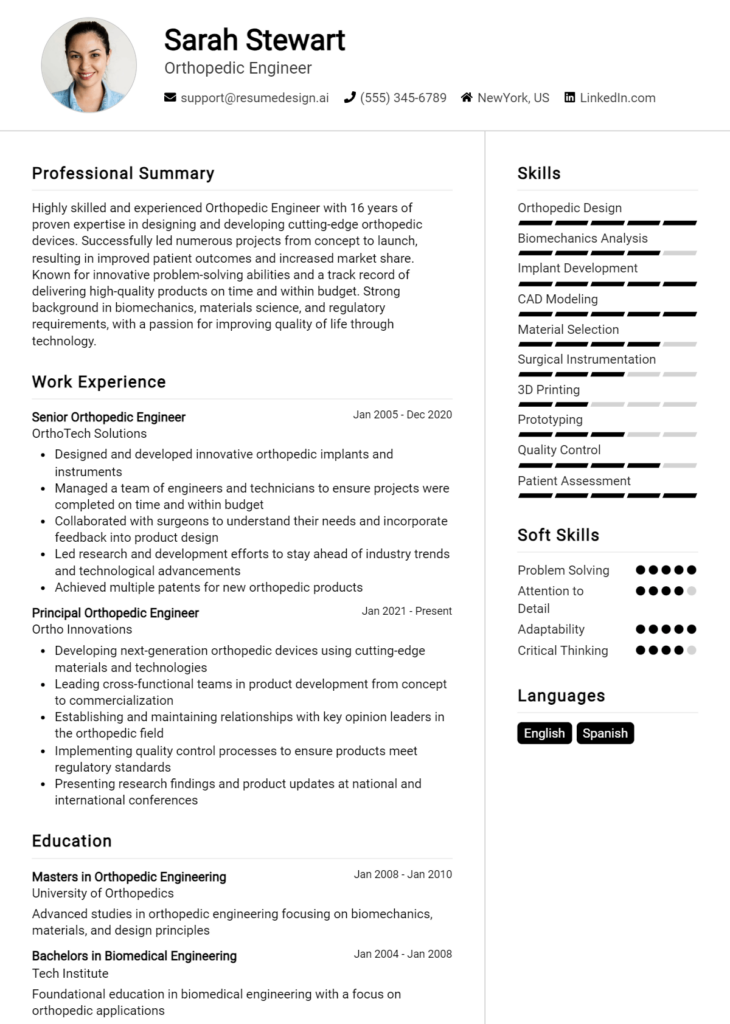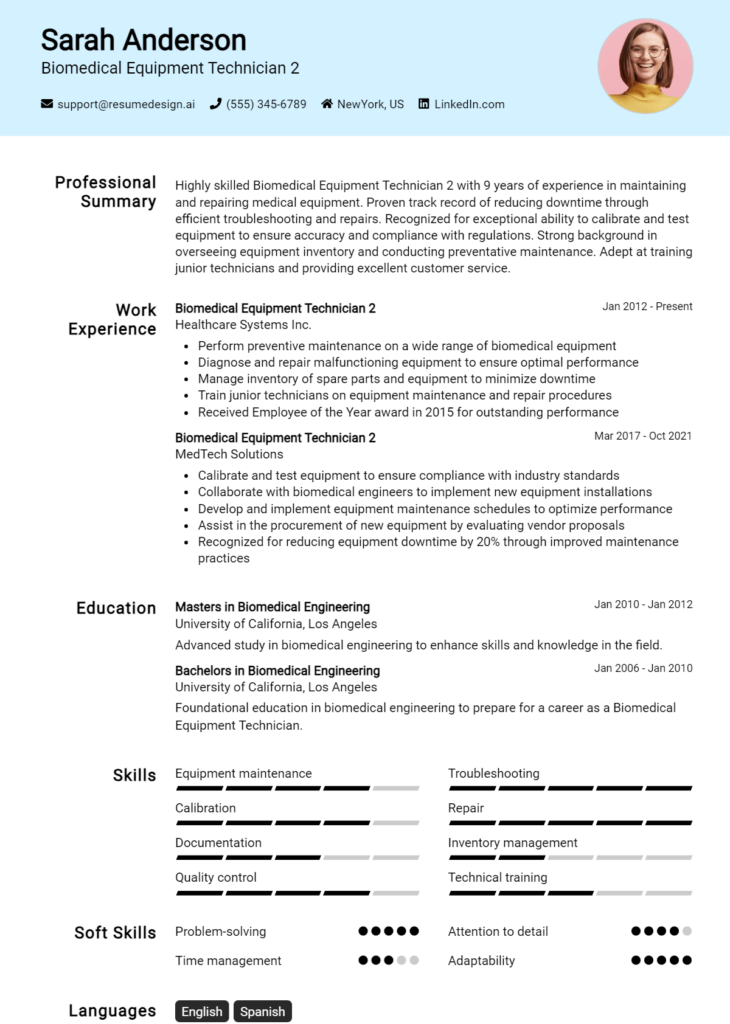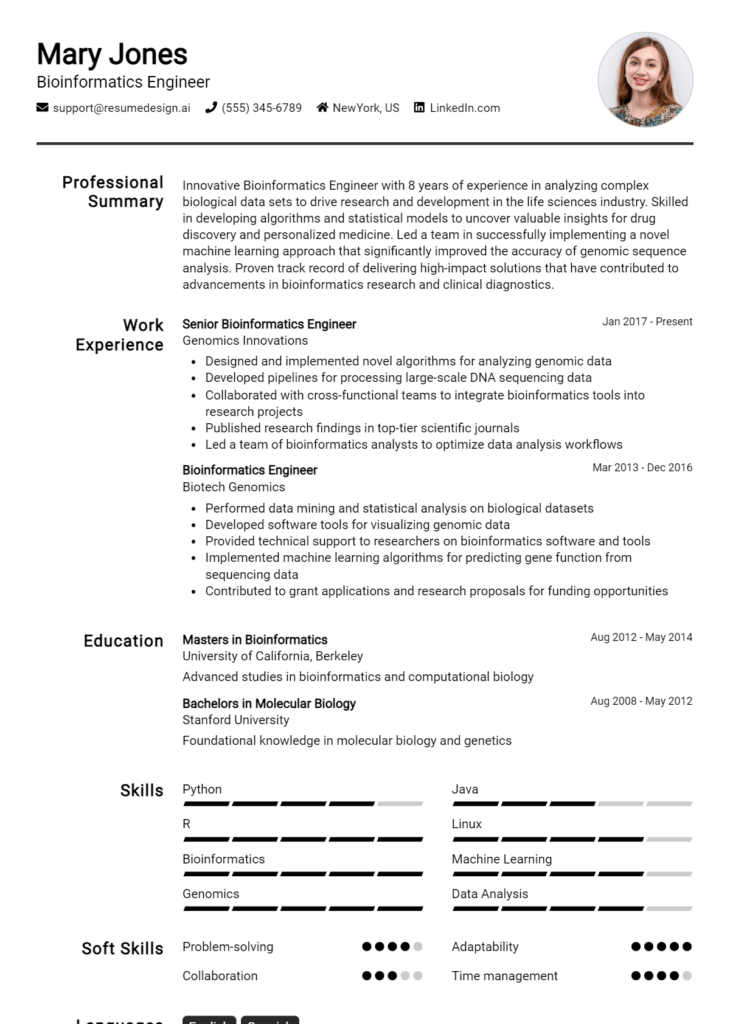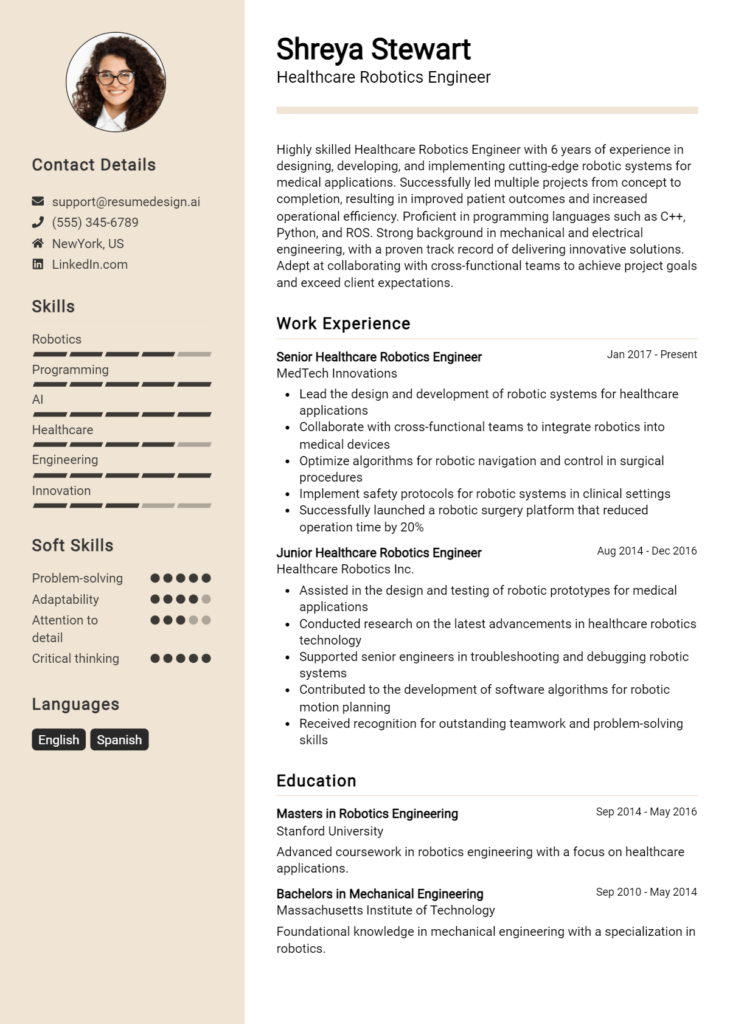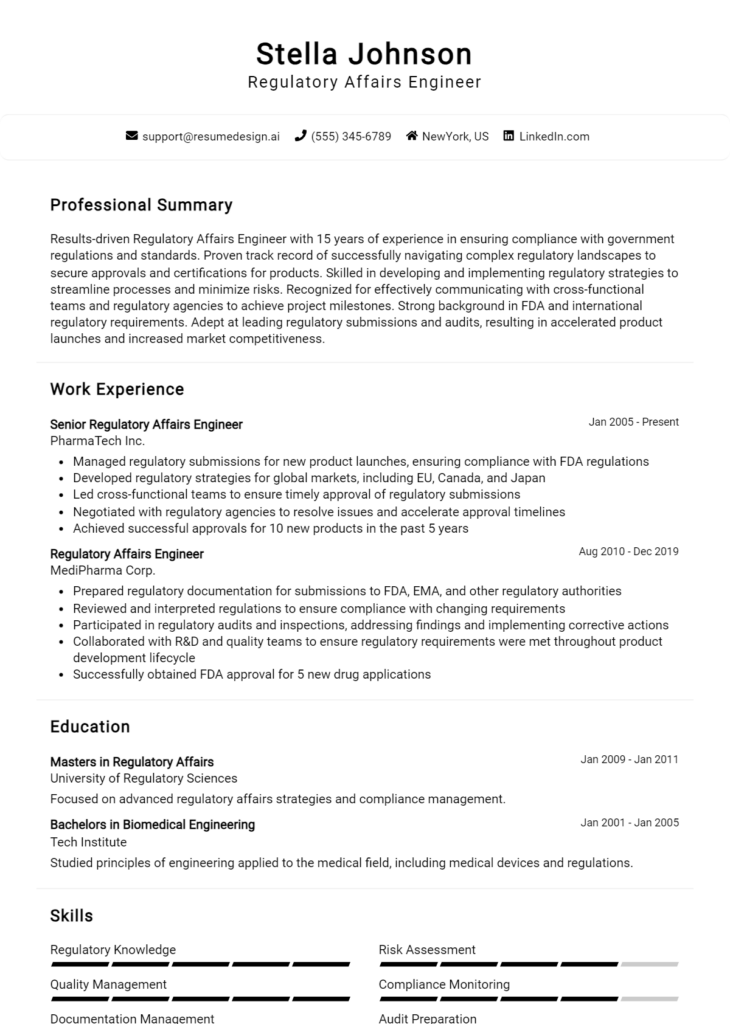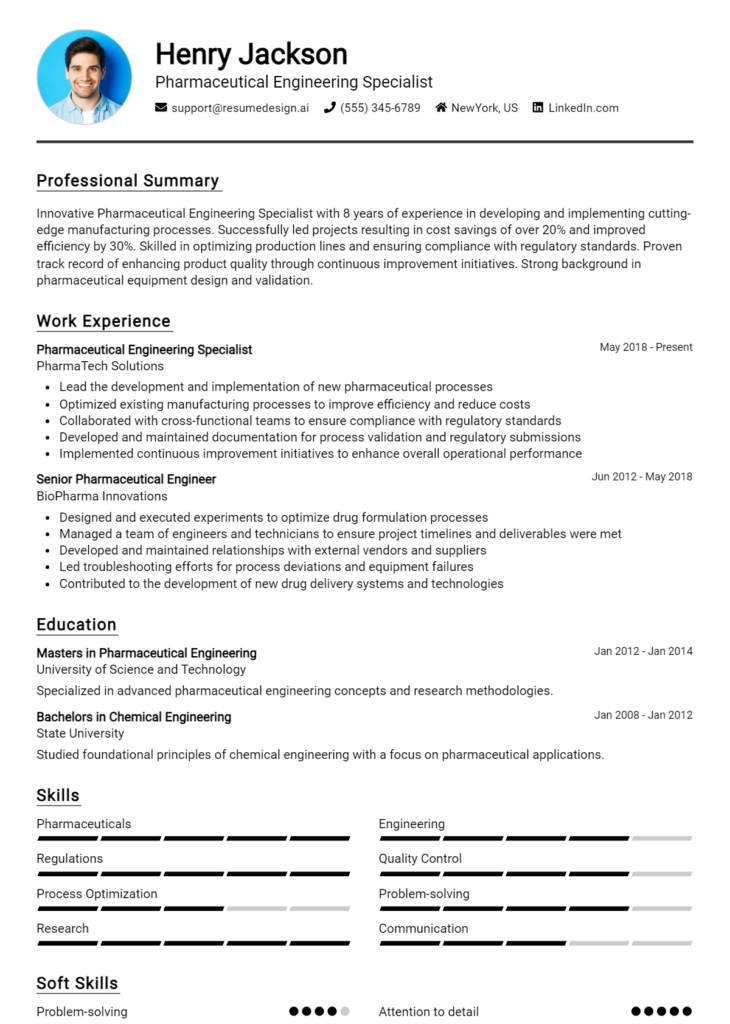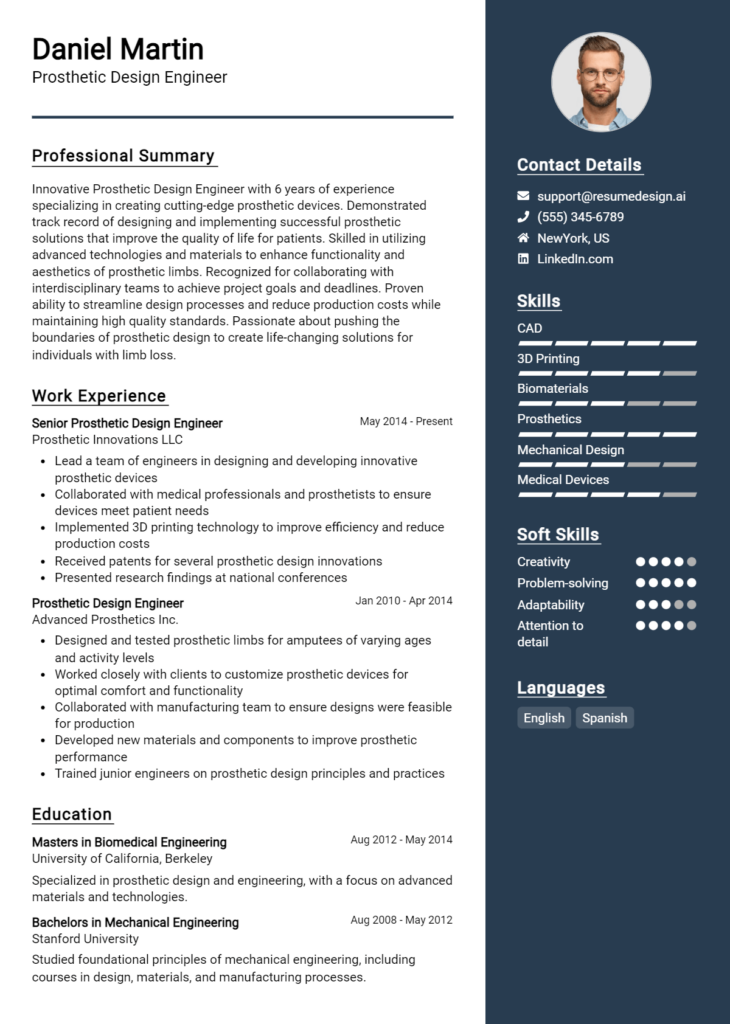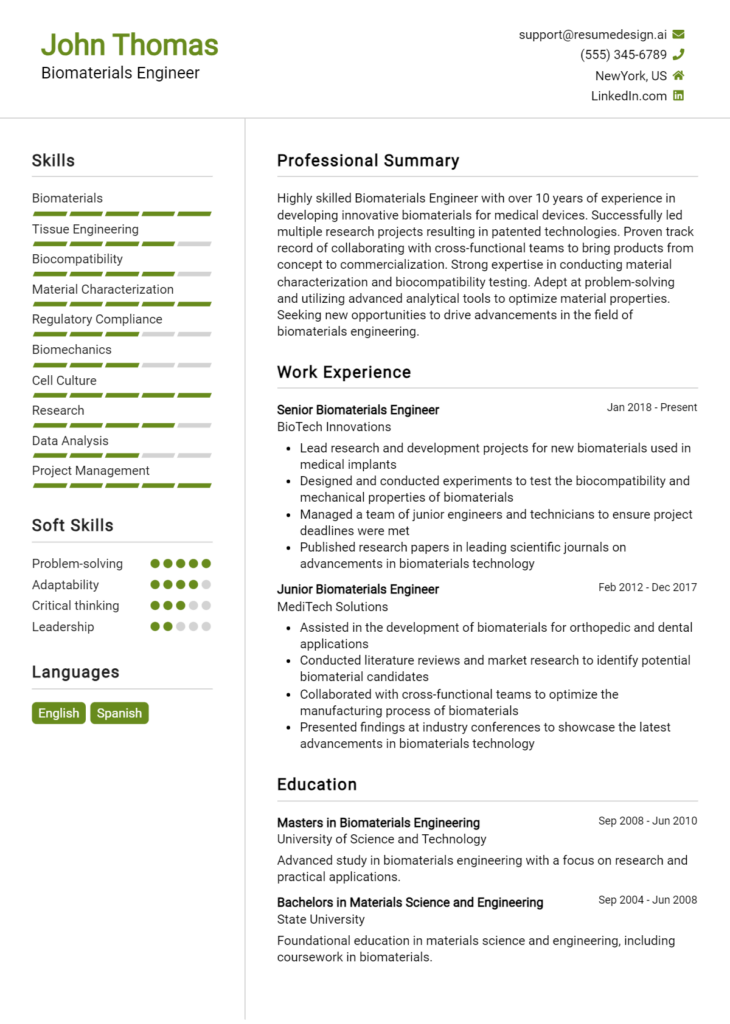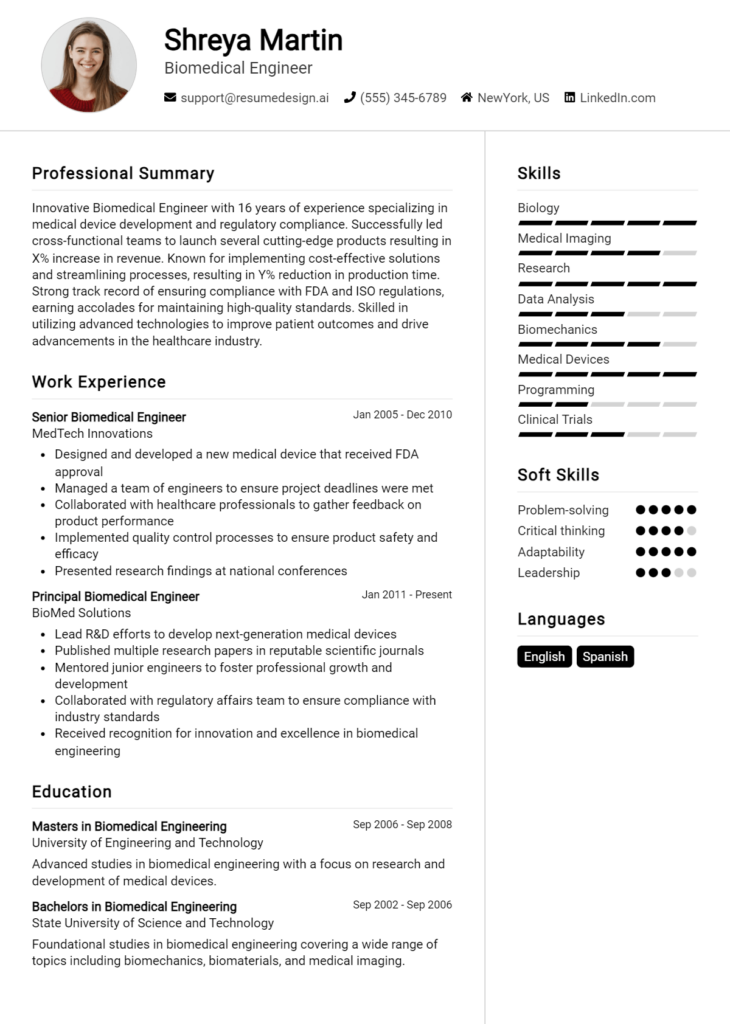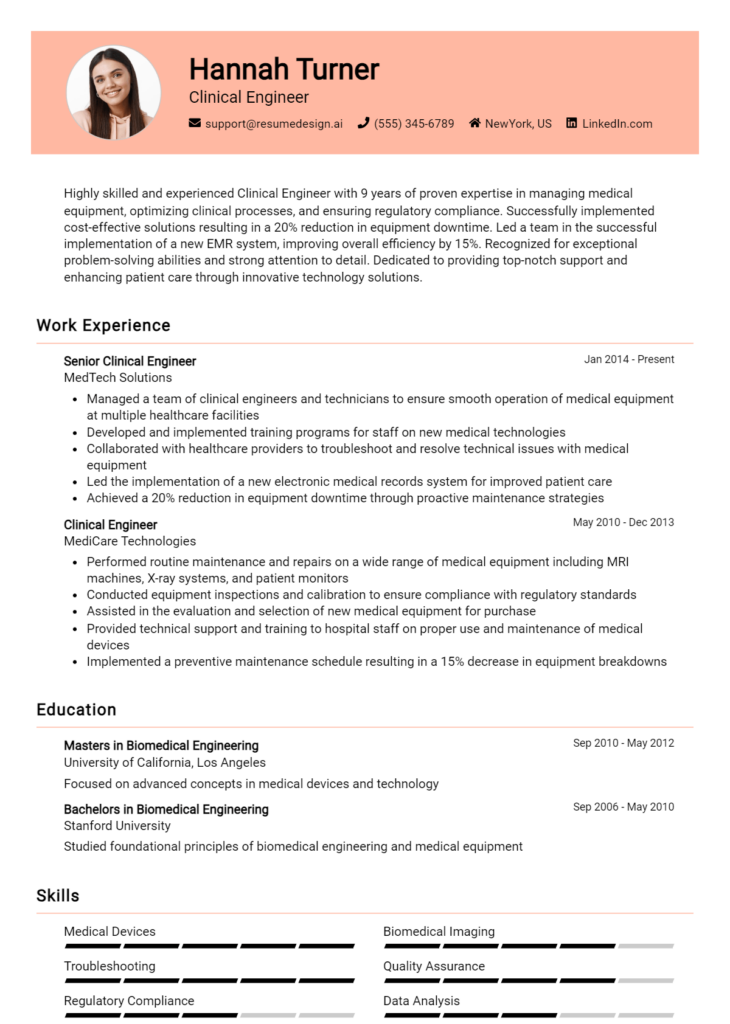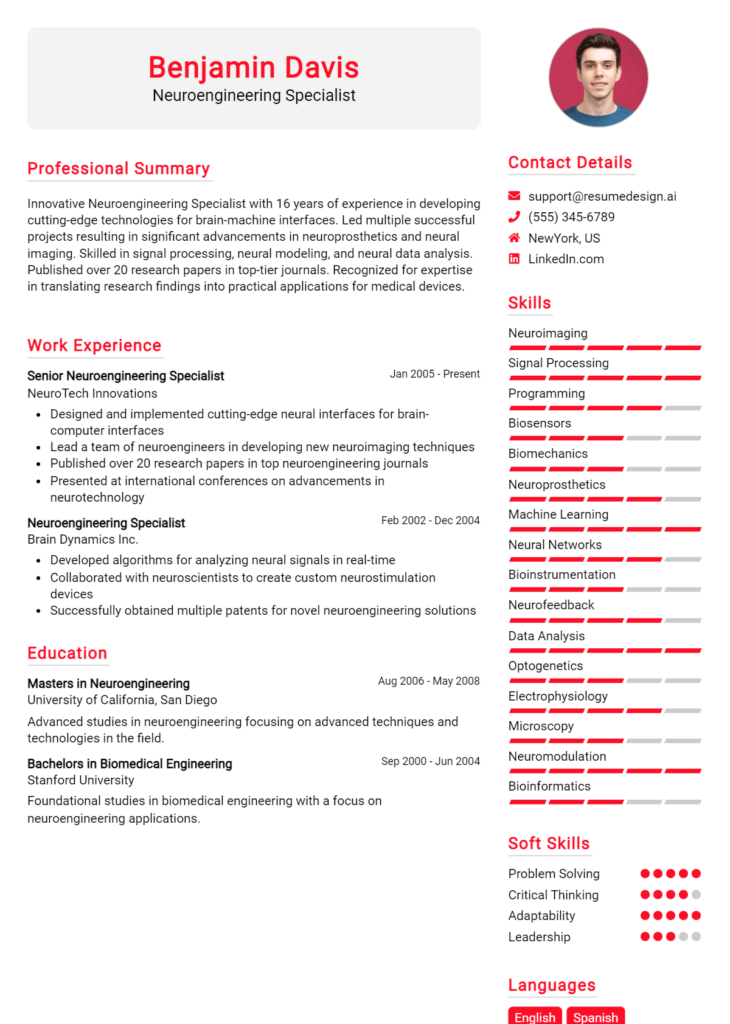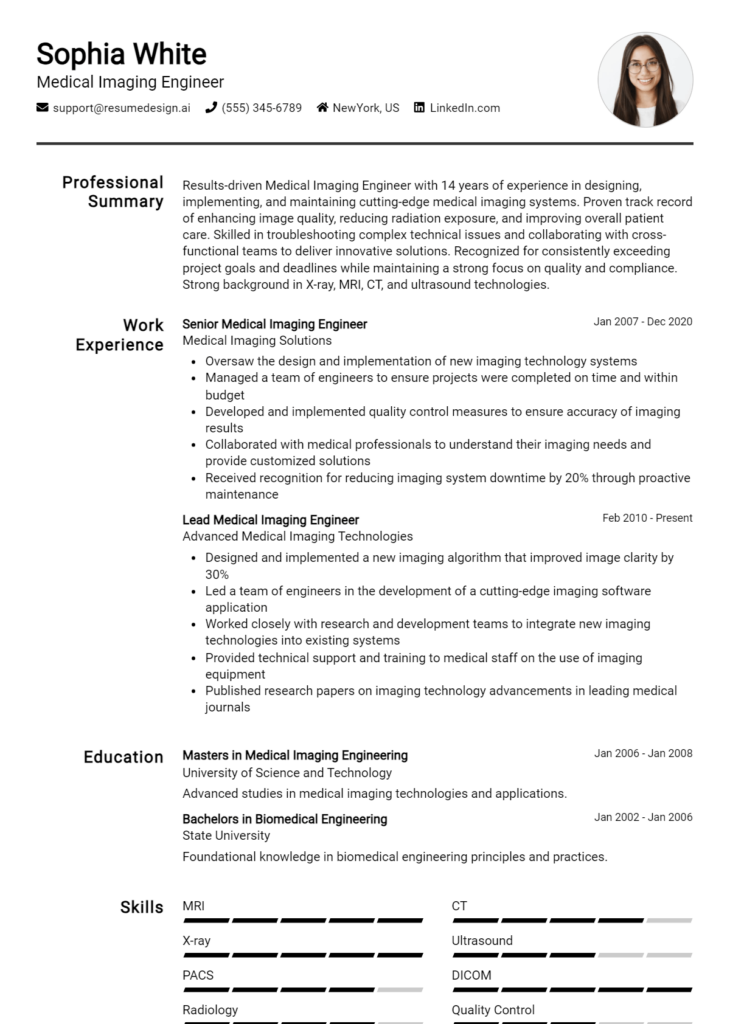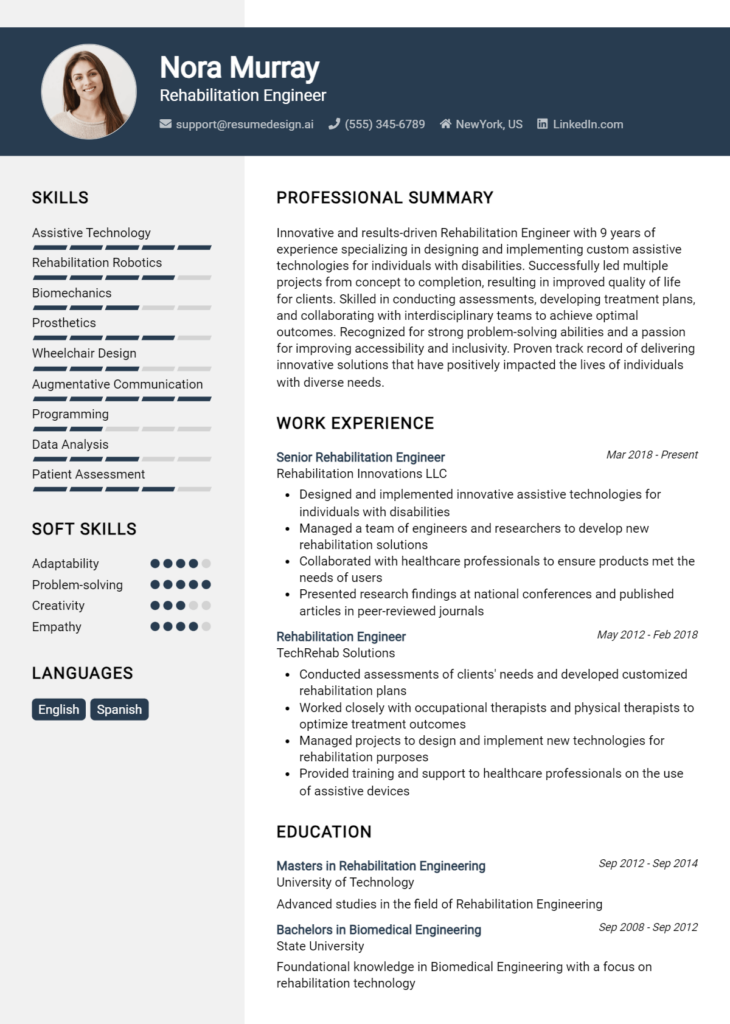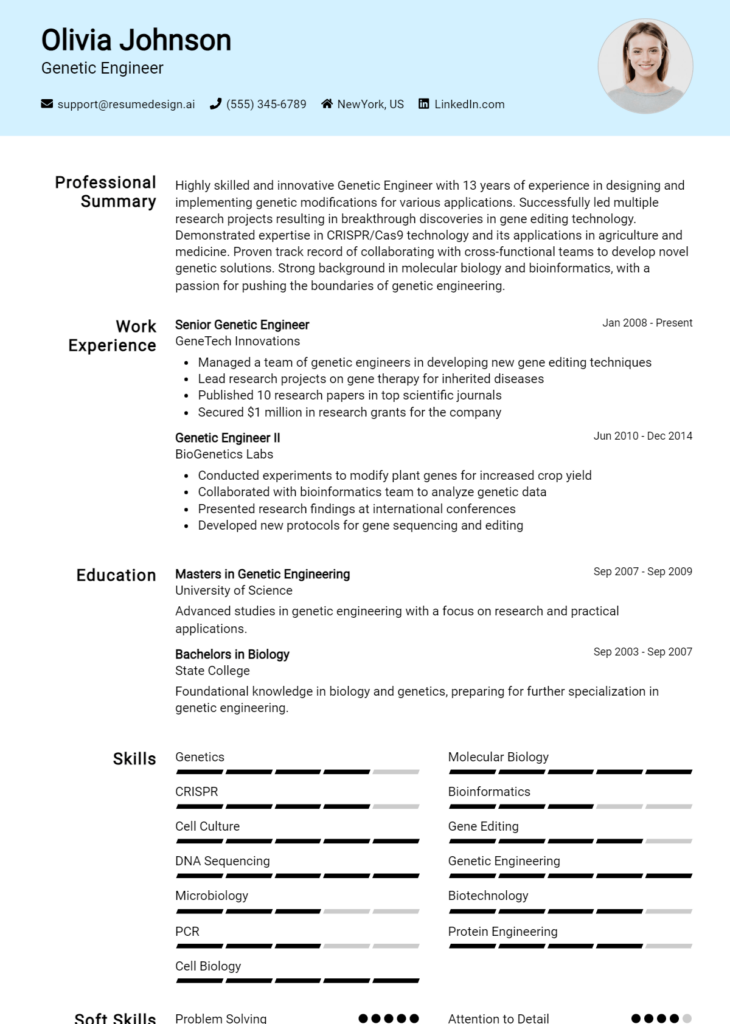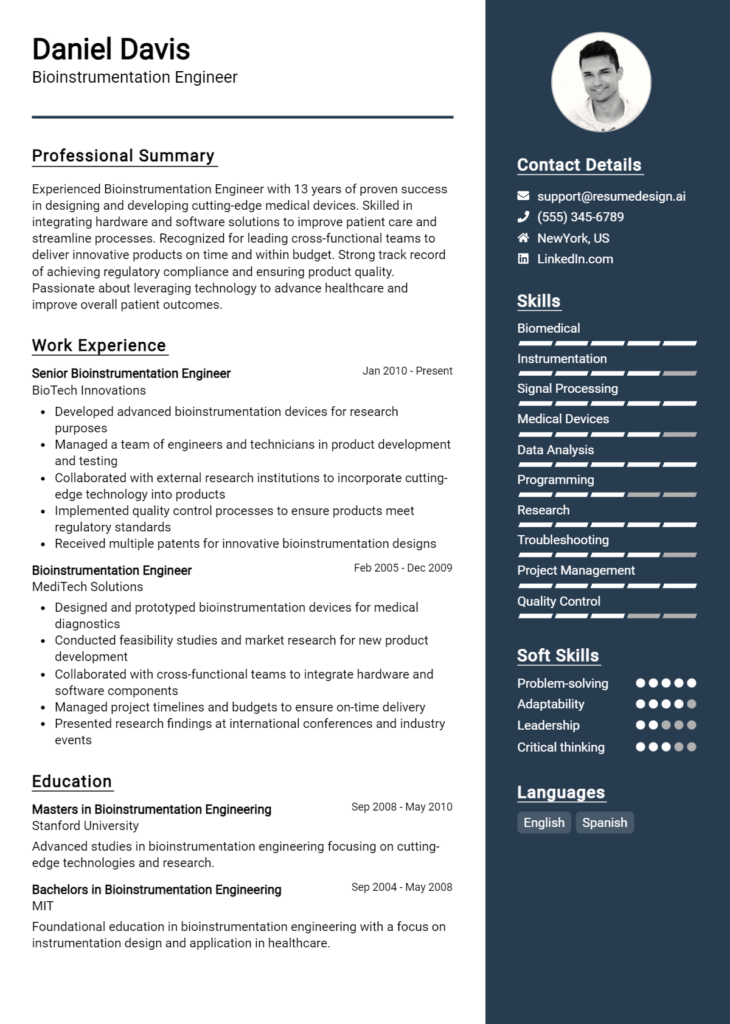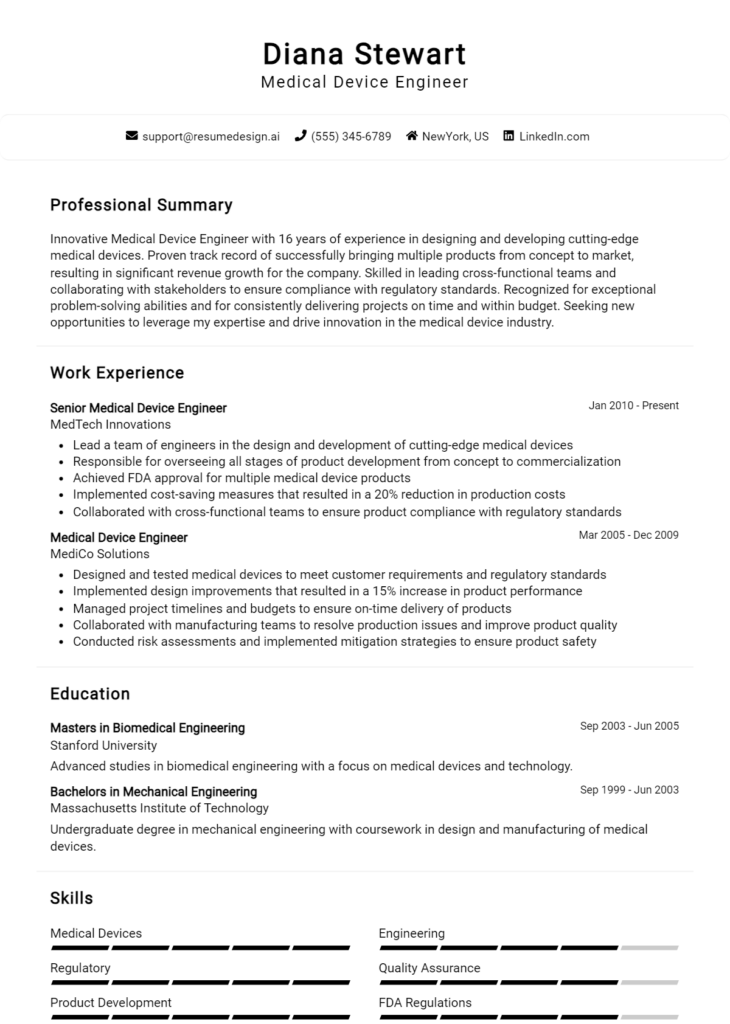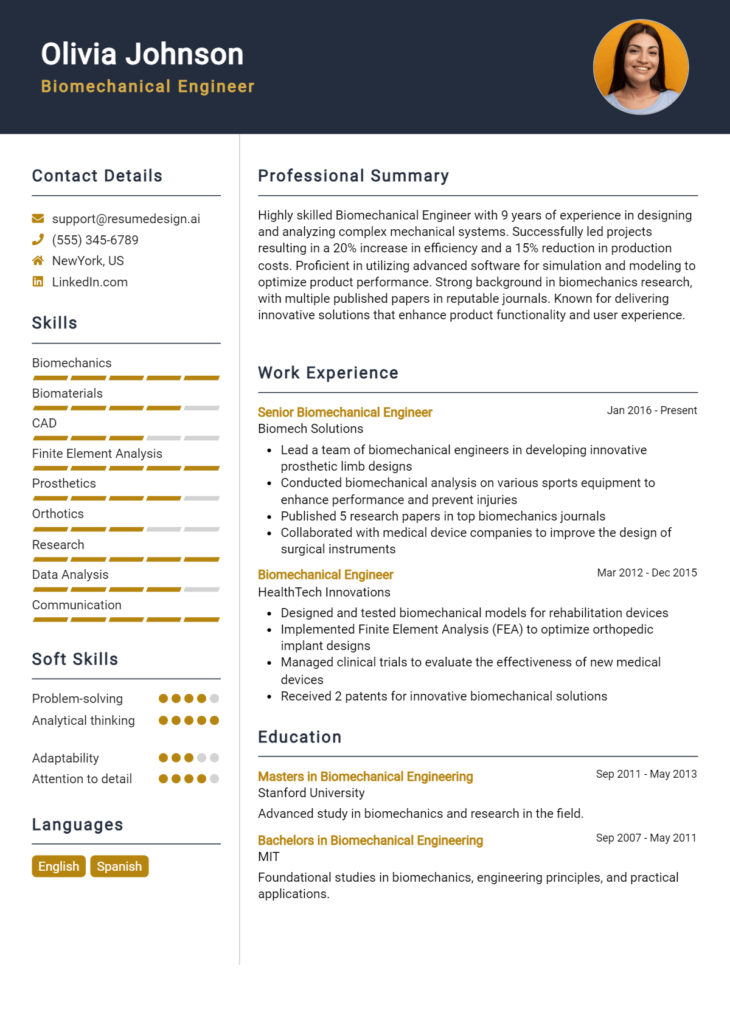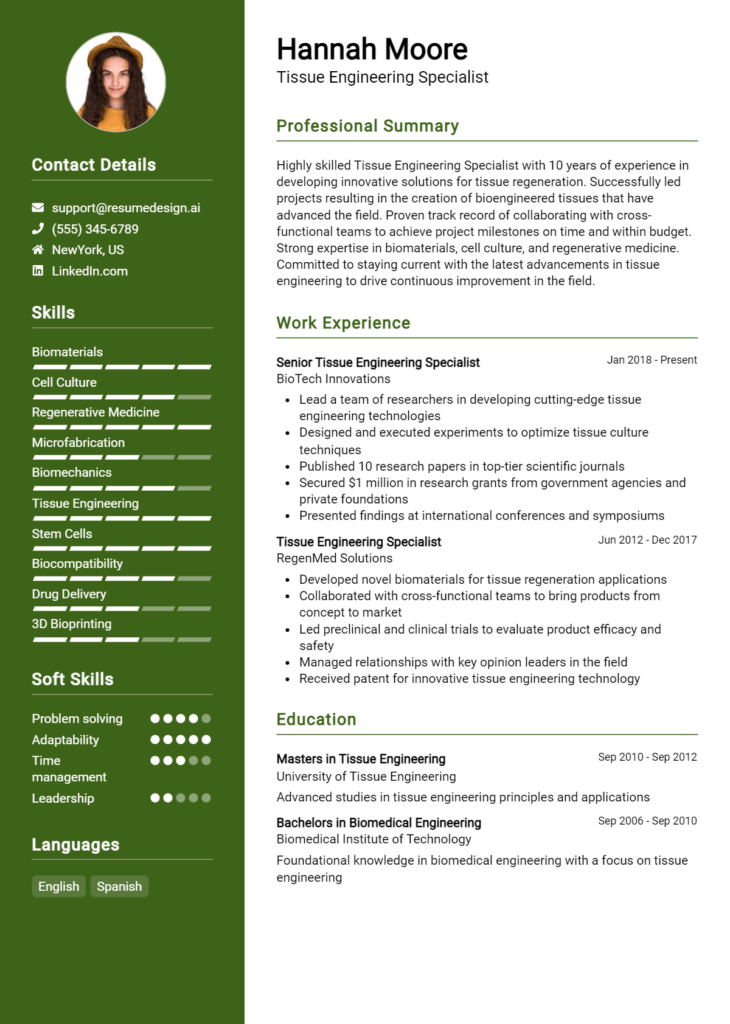Cardiovascular Devices Engineer Core Responsibilities
A Cardiovascular Devices Engineer plays a crucial role in the design, development, and testing of medical devices aimed at treating heart-related conditions. This position requires a blend of technical expertise, operational acumen, and problem-solving skills, enabling effective collaboration across departments such as R&D, quality assurance, and regulatory affairs. These professionals help ensure that innovative solutions align with organizational goals, enhancing patient outcomes. A well-structured resume highlighting relevant skills and experiences is essential for showcasing qualifications in this competitive field.
Common Responsibilities Listed on Cardiovascular Devices Engineer Resume
- Design and develop cardiovascular medical devices, including stents and pacemakers.
- Conduct feasibility studies and risk assessments for new product innovations.
- Collaborate with cross-functional teams to ensure compliance with regulatory standards.
- Perform rigorous testing and validation of device prototypes to ensure safety and efficacy.
- Analyze and interpret data from clinical trials and user feedback.
- Prepare technical documentation for regulatory submissions and audits.
- Maintain up-to-date knowledge of industry trends and emerging technologies.
- Provide technical support and training to manufacturing and clinical teams.
- Implement design controls and quality management systems throughout the product lifecycle.
- Assist in troubleshooting and resolving product-related issues in the field.
- Participate in product lifecycle management and continuous improvement initiatives.
High-Level Resume Tips for Cardiovascular Devices Engineer Professionals
For professionals in the field of cardiovascular devices engineering, a well-crafted resume is not just a document—it's a powerful tool that can open doors to exciting career opportunities. As the first impression a candidate makes on potential employers, the resume must effectively showcase both skills and achievements that are relevant to the specialized nature of this industry. A compelling resume can differentiate you from other candidates, providing a clear snapshot of your expertise in designing, developing, and testing cardiovascular devices. This guide will offer practical and actionable resume tips specifically tailored for cardiovascular devices engineer professionals, ensuring that your application stands out in a competitive job market.
Top Resume Tips for Cardiovascular Devices Engineer Professionals
- Tailor your resume to the specific job description by incorporating keywords and phrases that align with the role.
- Highlight relevant experience in cardiovascular device design, development, and regulatory compliance to demonstrate your expertise.
- Quantify your achievements with metrics, such as the number of projects completed, time saved, or improvements made to device performance.
- Showcase industry-specific skills, such as proficiency in CAD software, knowledge of FDA regulations, or experience with clinical trials.
- Include a summary statement that encapsulates your professional background and key skills in cardiovascular device engineering.
- Use clear and concise language to describe your responsibilities and accomplishments, avoiding jargon that may not be familiar to all readers.
- Incorporate any relevant certifications or training, such as Six Sigma or project management, that enhance your qualifications.
- Emphasize teamwork and collaboration by mentioning cross-functional projects or partnerships with healthcare professionals.
- Keep your resume format clean and professional, ensuring easy readability and logical flow of information.
By implementing these tips, cardiovascular devices engineer professionals can significantly increase their chances of landing a job in this specialized field. A well-structured resume that effectively highlights relevant skills, experiences, and achievements will not only catch the attention of hiring managers but also demonstrate your commitment to excellence in the cardiovascular devices industry.
Why Resume Headlines & Titles are Important for Cardiovascular Devices Engineer
In the competitive field of cardiovascular devices engineering, a well-crafted resume headline or title serves as a vital first impression for potential employers. It encapsulates the candidate's core qualifications and sets the tone for the entire resume, allowing hiring managers to quickly ascertain whether the applicant possesses the necessary skills and experience. A strong headline should be concise, relevant, and directly related to the specific job being applied for, effectively summarizing the candidate's unique value proposition in just a few impactful words. This can significantly increase the chances of capturing attention in a sea of applicants.
Best Practices for Crafting Resume Headlines for Cardiovascular Devices Engineer
- Keep it concise: Aim for no more than 10-12 words.
- Be role-specific: Tailor the headline to the cardiovascular devices engineering field.
- Highlight key skills: Include essential skills or technologies relevant to the role.
- Showcase experience: Mention years of experience or notable achievements.
- Use action-oriented language: Start with active verbs or impactful adjectives.
- Avoid jargon: Make sure the language is clear and easily understood.
- Incorporate keywords: Use industry-specific keywords to enhance visibility.
- Reflect your unique selling proposition: Communicate what sets you apart from other candidates.
Example Resume Headlines for Cardiovascular Devices Engineer
Strong Resume Headlines
Innovative Cardiovascular Devices Engineer with 7+ Years in Product Development
Experienced Biomedical Engineer Specializing in Cardiac Device Design and Testing
Results-Driven Engineer Focused on Advancements in Cardiovascular Technology
Proven Track Record in FDA Submissions for Cardiovascular Devices
Weak Resume Headlines
Engineer Looking for Opportunities
Professional with Experience
Seeking a Job in Engineering
The strong headlines are effective because they immediately convey specific information about the candidate's experience, skills, and focus area within cardiovascular devices engineering. They utilize impactful language that resonates with hiring managers and highlights the candidate's unique qualifications. In contrast, the weak headlines fail to impress due to their vagueness and lack of detail, leaving employers with no clear understanding of the candidate's capabilities or what they bring to the table. A strong, focused headline can be the key differentiator in a competitive job market.
Writing an Exceptional Cardiovascular Devices Engineer Resume Summary
A resume summary is a crucial component for a Cardiovascular Devices Engineer, as it serves as the first impression a hiring manager receives from a candidate's application. A well-crafted summary succinctly highlights key skills, relevant experience, and notable accomplishments, immediately capturing the attention of potential employers. In a competitive field like cardiovascular device engineering, an impactful summary can differentiate a candidate by showcasing their unique qualifications tailored to the specific job they are applying for. Therefore, it is essential for the summary to be concise, engaging, and directly aligned with the needs of the employer.
Best Practices for Writing a Cardiovascular Devices Engineer Resume Summary
- Quantify achievements: Use numbers to illustrate your accomplishments, such as the number of projects completed or percentage improvements in device performance.
- Focus on relevant skills: Highlight technical skills and competencies that are specifically relevant to cardiovascular devices and engineering.
- Tailor the summary: Customize the summary for each job application, aligning it with the job description and requirements.
- Use action verbs: Start sentences with strong action verbs to create a dynamic and engaging summary.
- Keep it concise: Aim for 3-5 sentences that effectively convey your qualifications without overwhelming the reader.
- Showcase industry knowledge: Include references to relevant technologies, methodologies, or regulations in the cardiovascular field.
- Highlight problem-solving abilities: Emphasize any experience with troubleshooting or innovating solutions for cardiovascular devices.
- Maintain a professional tone: Ensure the summary reflects professionalism and expertise appropriate for the engineering field.
Example Cardiovascular Devices Engineer Resume Summaries
Strong Resume Summaries
Results-driven Cardiovascular Devices Engineer with over 8 years of experience in developing innovative cardiac monitoring devices. Successfully led a cross-functional team to launch a wearable ECG monitor that improved patient compliance by 25%, while adhering to ISO 13485 standards.
Dedicated engineer specializing in cardiovascular implantable devices, with a proven track record of increasing product performance efficiency by 30% through rigorous testing and validation processes. Instrumental in the design and optimization of a new stent technology, resulting in FDA approval ahead of schedule.
Experienced Cardiovascular Devices Engineer with a focus on product development and regulatory compliance. Successfully managed multiple projects that reduced time-to-market by 15%, utilizing advanced CAD software and collaborating with clinical teams to ensure user-centered design.
Weak Resume Summaries
Engineer with experience in the medical field looking for a new position. I have worked on various projects and have some skills in engineering.
Motivated professional with a background in cardiovascular devices. I am seeking opportunities to further my career and contribute to a team.
The strong resume summaries are effective because they provide specific details about achievements, quantify results, and demonstrate relevance to the role, making the candidates stand out. In contrast, the weak summaries lack specificity and quantifiable outcomes, making them appear generic and unmemorable, which could lead to missed opportunities in a competitive job market.
Work Experience Section for Cardiovascular Devices Engineer Resume
The work experience section is a pivotal component of a Cardiovascular Devices Engineer resume, as it provides a platform for candidates to illustrate their technical skills, leadership capabilities, and commitment to delivering high-quality products. This section not only highlights relevant experiences but also quantifies achievements to demonstrate the impact of the candidate's contributions in previous roles. By aligning their experience with industry standards and showcasing their ability to manage teams effectively, candidates can present themselves as highly qualified professionals in the competitive field of cardiovascular devices.
Best Practices for Cardiovascular Devices Engineer Work Experience
- Highlight specific technical skills relevant to cardiovascular device design and development.
- Quantify accomplishments with metrics, such as improved product performance or reduced time-to-market.
- Detail leadership experiences, including team management and project oversight.
- Illustrate collaboration with cross-functional teams, including R&D, manufacturing, and regulatory affairs.
- Emphasize adherence to industry standards and compliance with regulatory requirements.
- Showcase continuous improvement initiatives and their positive outcomes.
- Include relevant certifications or training that enhance credibility and expertise.
- Use action verbs to convey a sense of proactivity and accomplishment.
Example Work Experiences for Cardiovascular Devices Engineer
Strong Experiences
- Led a team of 5 engineers in the development of a new stent design, resulting in a 30% reduction in delivery time and a 15% increase in patient outcomes.
- Managed the successful launch of a cardiac monitoring device, achieving FDA approval 3 months ahead of schedule.
- Collaborated with manufacturing and quality assurance teams to implement a new quality control process, reducing defects by 20% within the first year.
- Designed and tested a novel catheter that decreased procedural complications by 25%, enhancing patient safety and satisfaction.
Weak Experiences
- Worked on various projects related to cardiovascular devices.
- Helped improve processes within the engineering team.
- Participated in meetings with cross-functional teams.
- Assisted with the development of medical devices.
The examples provided illustrate the stark contrast between strong and weak experiences. The strong experiences are characterized by specific, quantifiable outcomes, showcasing the candidate's direct impact on product development and team leadership. In contrast, the weak experiences lack detail and measurable results, making them less compelling and failing to convey the candidate's true capabilities in the field of cardiovascular devices engineering.
Education and Certifications Section for Cardiovascular Devices Engineer Resume
The education and certifications section in a Cardiovascular Devices Engineer resume is crucial for showcasing a candidate's academic qualifications and industry-related expertise. This section not only reflects the foundational knowledge acquired through formal education but also highlights the candidate's commitment to continuous professional development through relevant certifications and specialized training. By including pertinent coursework, recognized credentials, and ongoing learning efforts, candidates can significantly boost their credibility and demonstrate their alignment with the specific demands of the cardiovascular devices field.
Best Practices for Cardiovascular Devices Engineer Education and Certifications
- Prioritize relevant degrees in biomedical engineering, mechanical engineering, or related fields.
- Highlight industry-recognized certifications such as Certified Biomedical Equipment Technician (CBET) or Certified Quality Engineer (CQE).
- Include specific coursework related to cardiovascular devices, such as biomaterials, device design, or regulatory affairs.
- Detail any hands-on training or workshops that enhance practical skills relevant to cardiovascular engineering.
- Keep the information up-to-date, removing outdated or less relevant qualifications.
- Use clear and concise language to present educational achievements and certifications.
- Organize the section in reverse chronological order to emphasize the most recent accomplishments.
- Consider adding affiliations with professional organizations, such as the Biomedical Engineering Society (BMES), to enhance professional credibility.
Example Education and Certifications for Cardiovascular Devices Engineer
Strong Examples
- M.S. in Biomedical Engineering, University of California, San Diego, 2022
- Certified Biomedical Equipment Technician (CBET), 2023
- Coursework: Advanced Cardiovascular Devices Design, Regulatory Affairs for Medical Devices
- Hands-on Training: Implantable Device Technologies Workshop, 2023
Weak Examples
- B.A. in History, University of Florida, 2016
- Certification in Basic First Aid, 2020
- Coursework: Introduction to Photography
- Online Course in General Business Management, 2019
The strong examples are considered effective because they directly relate to the field of cardiovascular engineering, showcasing advanced degrees, relevant certifications, and specialized coursework that align with industry standards. In contrast, the weak examples highlight qualifications that are either unrelated to the job role or lack relevance to the specific skills and knowledge required for a Cardiovascular Devices Engineer, demonstrating a disconnect from the industry focus.
Top Skills & Keywords for Cardiovascular Devices Engineer Resume
In the highly specialized field of cardiovascular devices engineering, the importance of showcasing the right skills in your resume cannot be overstated. Employers seek candidates who not only possess technical proficiency but also exhibit strong interpersonal abilities that foster collaboration and innovation. A well-crafted resume highlights these skills, demonstrating a candidate's capability to contribute to the development of life-saving technologies. By articulating both hard and soft skills effectively, you can make a compelling case for your candidacy in this critical medical sector.
Top Hard & Soft Skills for Cardiovascular Devices Engineer
Soft Skills
- Communication
- Team Collaboration
- Problem-Solving
- Critical Thinking
- Time Management
- Adaptability
- Attention to Detail
- Creativity
- Leadership
- Empathy
Hard Skills
- Medical Device Design
- CAD Software Proficiency (e.g., SolidWorks, AutoCAD)
- Regulatory Compliance (FDA, ISO standards)
- Testing and Validation Techniques
- Materials Science Knowledge
- Prototyping and Manufacturing Processes
- Risk Management
- Data Analysis and Interpretation
- Electrical and Mechanical Engineering Principles
- Clinical Trials Understanding
For a deeper dive into the importance of skills and work experience in your resume, consider how each element contributes to your overall professional narrative.
Stand Out with a Winning Cardiovascular Devices Engineer Cover Letter
I am excited to apply for the Cardiovascular Devices Engineer position at [Company Name], as advertised on [Job Board/Company Website]. With a robust background in biomedical engineering and a deep passion for advancing cardiovascular technology, I am eager to contribute my skills and expertise to your team. My experience in designing, testing, and improving cardiovascular devices aligns well with the requirements of this role and reflects my commitment to enhancing patient outcomes through innovative engineering solutions.
During my tenure at [Previous Company Name], I successfully led a project that developed a novel stent design, which resulted in a 30% increase in patient compatibility and reduced post-operative complications. My role involved collaborating with cross-functional teams to ensure regulatory compliance, conducting thorough testing, and analyzing performance data to refine our designs. This experience honed my technical skills in CAD software, prototyping, and materials science, while also enhancing my ability to communicate effectively with both technical and non-technical stakeholders.
I am particularly drawn to [Company Name] because of your commitment to pioneering advancements in cardiovascular technology. I admire your recent innovations, such as [specific product or technology], and I am eager to bring my expertise in device engineering and problem-solving to your team. I am confident that my proactive approach and dedication to quality will help drive your projects forward and contribute to the ongoing success of your organization.
Thank you for considering my application. I look forward to the opportunity to discuss how my background, skills, and enthusiasms align with the goals of [Company Name]. I am excited about the potential to contribute to your innovative projects and am eager to bring my passion for cardiovascular engineering to your esteemed team.
Common Mistakes to Avoid in a Cardiovascular Devices Engineer Resume
When crafting a resume for a Cardiovascular Devices Engineer position, it’s essential to present your qualifications and experiences in the best possible light. However, many candidates make common mistakes that can undermine their application. Understanding these pitfalls can help you create a resume that effectively showcases your skills and stands out to hiring managers in the competitive field of medical device engineering.
Neglecting Tailoring: Failing to customize your resume for the specific job can make it seem generic. Always align your skills and experiences with the job description to demonstrate your suitability for the role.
Excessive Jargon: While technical terminology is important, overloading your resume with jargon can confuse hiring managers who may not have a technical background. Aim for clarity and conciseness to effectively communicate your qualifications.
Ignoring Achievements: Listing job responsibilities without highlighting achievements can make your experience seem less impactful. Use quantifiable outcomes to showcase how your contributions improved processes or outcomes.
Lack of Specificity: Being vague about your skills or experiences can reduce the effectiveness of your resume. Provide specific examples, such as the types of cardiovascular devices you have worked with and the technologies you are proficient in.
Poor Formatting: A cluttered or poorly organized resume can be difficult to read. Use clear headings, bullet points, and consistent formatting to enhance readability and make key information easily accessible.
Omitting Relevant Certifications: Failing to include relevant certifications or licenses can be a missed opportunity. Highlight any specialized training or certifications that are pertinent to cardiovascular device engineering, as they can set you apart from other candidates.
Inconsistent Tenses: Using inconsistent verb tenses can create confusion about your current and past roles. Stick to the past tense for previous jobs and the present tense for your current position to maintain clarity.
Overlooking Soft Skills: While technical expertise is crucial, soft skills such as teamwork, communication, and problem-solving are equally important in engineering roles. Be sure to include examples that demonstrate these skills in your resume.
Conclusion
As a Cardiovascular Devices Engineer, your expertise plays a crucial role in the development and innovation of medical devices that improve heart health and save lives. Throughout this article, we've explored the essential skills and qualifications needed for this dynamic role, including a strong foundation in biomedical engineering, proficiency in device design and testing, and a thorough understanding of regulatory standards.
We also highlighted the importance of experience with advanced technologies, teamwork, and problem-solving abilities, all of which are vital in successfully bringing cardiovascular devices from concept to market. Additionally, we discussed the significance of staying updated with the latest industry trends and advancements to ensure your skills remain relevant.
In conclusion, it’s imperative to have a compelling resume that effectively showcases your qualifications and achievements as a Cardiovascular Devices Engineer. Take a moment to review your resume and ensure it reflects your expertise and experience accurately. To assist you in this process, consider utilizing the following resources:
- Resume Templates to find a format that suits your professional style.
- Resume Builder to help you create a polished and professional resume quickly.
- Resume Examples for inspiration on how to articulate your achievements.
- Cover Letter Templates to complement your resume with a strong introduction.
Take action now and enhance your professional presentation to stand out in the competitive field of cardiovascular device engineering!

